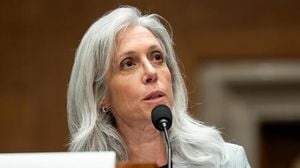Wall Street is bracing itself for what many believe to be the long-awaited interest rate cut from the Federal Reserve. Analysts are largely expecting the Fed Chair Jerome Powell to announce a 25 basis point (bps) cut during the Federal Open Market Committee (FOMC) meeting on Wednesday. This expectation has been building over weeks among financial market participants, with several banks even pricing this anticipated reduction. Yet, as excitement simmers, experts caution against surprises, as anything deviated from expectations could resultantly rattle the stock market.
After all, Powell and the Fed have been transparent about their changing perspectives on the economy. Recently, they indicated signs of easing inflation, which had reached worrying levels during the pandemic but appears to be heading back toward the Fed's target rate of 2%. This shift allows the FOMC to pivot toward employment, addressing the dual mandate of maintaining healthy inflation and supporting strong employment levels.
The buzz around the expected rate cut is palpable, and it has far-reaching consequences. A 25bps cut would make corporate and consumer borrowing cheaper, potentially stoking economic activity. This change could help dissipate fears of recession and reposition the economy for more growth, commonly referred to as achieving a "soft landing." That said, some institutions are wondering whether the Fed might surprise the market with a more substantial 50 bps cut, which could have unintended repercussions on inflation.
Mark Haefele, chief investment officer at UBS Global Wealth Management, hinted at the possibility of such bold moves but underscored the importance of data driving the Fed's decisions. His perspective suggests, "While there’s enough data for the Fed to start cutting rates amid labor market softening, there are no compelling reasons for aggressive cuts."
Interestingly, it has now become almost conventional wisdom among economists and analysts alike. Bank of America, for example, has also forecasted cuts coming hereto every other meeting through March 2025. Writing about laid-back confidence, their U.S. economists had termed the situation as being one of 'gradualism', supporting their stance with data rather than sheer speculation.
Yet, the streets are rife with voices of caution. Investors might react adversely if Powell opts for the larger cut. David Smith, chief investment officer at Rockland Trust, articulated this sentiment when he expressed concern over rapid changes by the Fed. He pointed out, "If the Fed made more aggressive moves like cutting by 50bps, investors might interpret this as the Federal Reserve sensing some lurking danger... and react accordingly."
Indeed, the last thing Wall Street wants is panic, especially after enduring so much volatility lately.
Across the board, various experts have noted the positive correlation between interest rate cuts and the hospitality sector. According to Bryan Wroten from Hotel News Now, the anticipated interest cuts are expected to spur hotel deals, leading to the resumption of many projects currently sidelined. Notably, Oxford Economics predicts the Fed will roll out these gradual 25bps cuts throughout 2025, which will likely invigorate both the transaction market and new hotel development plans.
Wroten referenced reports from JLL indicating how with market conditions finally signaling relief, increased buyer activity should follow the anticipated rate cuts. This optimism echoes sentiments shared by hotel executives, who are eager to capitalize on the more favorable borrowing conditions as the Fed signals its intention toward implementing more manageable lending rates.
"Interest rates being lowered offers long-awaited relief. It reshapes the financial environment, providing the capital necessary for much-needed transactions within the market," said Zach Demuth, global head of hotel research at JLL. Past forecasted conditions have already influenced forward-economic charts, demonstrating how this climate isn't unexpected for the markets. His assessment posits future transaction activity will be strongly correlated with these promised cuts, based on how buyers react once they see the benefits of borrowing becoming less burdensome.
While all these developments sound promising, one must also acknowledge the delayed impact rate cuts typically have on actual construction. Industry experts, including Isaac Collazo from STR, CoStar’s hospitality analytics firm, highlight the lag associated with hotel projects reaching final planning once capital becomes available. Presently, 761,000 hotel rooms are being planned across the U.S., but the actual construction pace heavily relies on not only lower borrowing costs but also the shifting perceptions of the economy affecting developers and lenders.
With the rising cost of materials and labor still compounding challenges within the sector, the response time to the anticipated interest cuts may not be as swift as projected. Collazo indicated, "Even with favorable conditions on financing, the immediate effect won't materialize until late 2025." Growth will not occur overnight, but over time as developers gain confidence following the cuts.
This perspective perhaps focuses on the broader consumer impact. The U.S. economy, once vibrant, is seeing signs of slowing down, which could lead to weaker labor markets. For businesses eyeing investments, lower interest rates could open doors. This transition might also correlate with increased business travel, as companies may feel more secure investing resources for events to invigorate their operations.
Of interest is how consumer behaviors will shift with these changes. Collazo offered some valuable insights, noting how individuals at the lower end of the income spectrum continue to struggle with elevated credit card debt, which has recently surged. Even as rates decline, credit card interest remains high, tightening disposable incomes for many and failing to rejuvenate those financial behaviors to pre-pandemic levels. Over time, as consumer sentiment regains its footing, returning comfort could prompt spending shifts.
While high-income households often remain insulated from credit pressures, families lower on the income spectrum have pressing financial concerns. Given the widening credit card balances increasing by 11%—though down from greater peaks earlier this year—monitoring these consumer behaviors is particularly important as America gradually transitions to more favorable economic conditions.
Overall, with the Federal Reserve's impending interest rate cuts hovering just around the corner, the financial world's anticipation is palpable. Whether easing the rates becomes the game-changer needed to usher the economy toward recovery and renewal remains speculative, yet these initial alterations appear to set the stage for meaningful transformation going forward.



